Read: Ephesians 6:10-17
In today’s Epistle, St. Paul tells us, “draw your strength from the Lord and from his mighty power. Put on the armor of God so that you may be able to stand firm against the tactics of the devil ….take the helmet of salvation and the sword of the Spirit, which is the word of God.” The true weapon of the Christian is not the metal sword, but the sword of the word. Hebrews tells us, “the word of God is living and effective, sharper than any two-edged sword, penetrating even between soul and spirit, joints and marrow, and able to discern reflections and thoughts of the heart” (Hebrews 4:12).
Christians do not meet violence with violence, but when persecuted, follow the Lord’s teaching, “Remember, you are not to prepare your defense beforehand, for I myself shall give you a wisdom in speaking that all your adversaries will be powerless to resist or refute” (Luke 21:14-15). Jesus is the Word of God, and his word is powerful indeed, and so the true power Christians comes when we speak in the truth of our Lord. Our human words may not seem that powerful, but words spoken in Christ can transform our lives. This power does not come from us, but from God, therefore, as St. Paul again says, “yet I live, no longer I, but Christ lives in me,” (Galatians 2:20) and yesterday’s epistle says, “If we live in the Spirit, let us also follow the Spirit” (Galatians 5:25).
All this has meaning in this Christmas season. We give gifts to one another, and parents instruct their children, say “Thank you,” to those who give you gifts. The words “thank you” are more powerful than the material gifts, for they form bonds of love. As Christians, we, too, say words of “thanks” that bind us in love to God, “the giver of every good and perfect gift” (James 1:17, Ambon Prayer).
In this church, we utter words of thanksgiving, as we offer our Liturgy, a “sacrifice of praise.” That is why we call the Liturgy the Eucharist, the Greek word for “thanksgiving.” And on Christmas, we offer words to the new-born child, “Christ is born! Glorify him.” We must not only says words with our mouth, “for, if you confess with your mouth that Jesus is Lord and believe in your heart that God raised him from the dead, you will be saved” (Romans 10:9).
Meditation by Archpriest David Petras

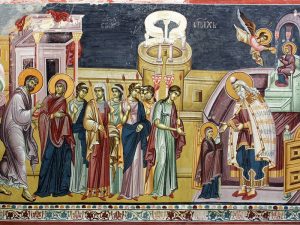 “Seeing the entrance of the pure one, angels marveled in wonder how the Virgin could enter the holy of holies.” (Refrain to Irmos 9, on the feast of the Entrance of the Theotokos into the Temple)
“Seeing the entrance of the pure one, angels marveled in wonder how the Virgin could enter the holy of holies.” (Refrain to Irmos 9, on the feast of the Entrance of the Theotokos into the Temple)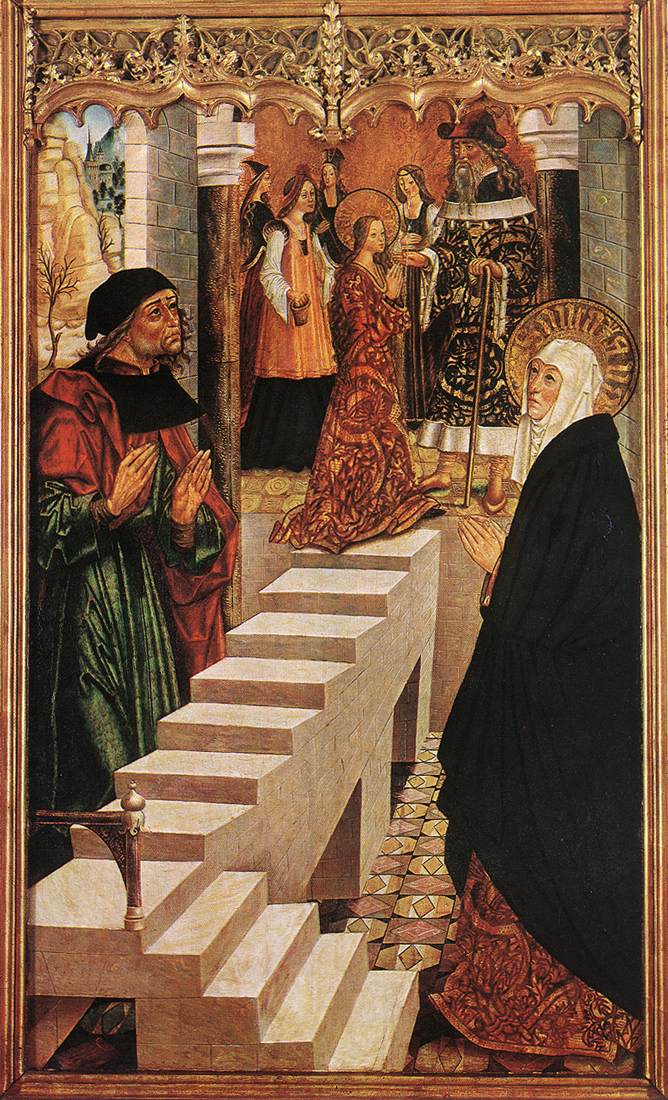 “Blessed are the blameless in the Way, who walk in the law of the Lord.” (Ps 118/119: 1, Septuagint)
“Blessed are the blameless in the Way, who walk in the law of the Lord.” (Ps 118/119: 1, Septuagint)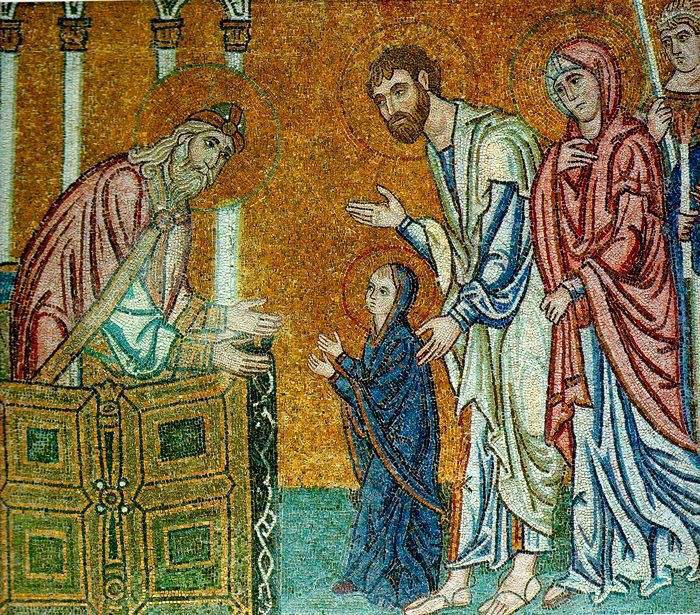 And the child was three years old, and Joachim said: Invite the daughters of the Hebrews that are undefiled, and let them take each a lamp, and let them stand with the lamps burning, that the child may not turn back, and her heart be captivated from the temple of the Lord. And they did so until they went up into the temple of the Lord. And the priest received her, and kissed her, and blessed her, saying: The Lord has magnified your name in all generations. In you, on the last of the days, the Lord will manifest His redemption to the sons of Israel. And he set her down upon the third step of the altar, and the Lord God sent grace upon her; and she danced with her feet, and all the house of Israel loved her. And her parents went down marveling, and praising the Lord God, because the child had not turned back. And Mary was in the temple of the Lord as if she were a dove that dwelt there, and she received food from the hand of an angel.”
And the child was three years old, and Joachim said: Invite the daughters of the Hebrews that are undefiled, and let them take each a lamp, and let them stand with the lamps burning, that the child may not turn back, and her heart be captivated from the temple of the Lord. And they did so until they went up into the temple of the Lord. And the priest received her, and kissed her, and blessed her, saying: The Lord has magnified your name in all generations. In you, on the last of the days, the Lord will manifest His redemption to the sons of Israel. And he set her down upon the third step of the altar, and the Lord God sent grace upon her; and she danced with her feet, and all the house of Israel loved her. And her parents went down marveling, and praising the Lord God, because the child had not turned back. And Mary was in the temple of the Lord as if she were a dove that dwelt there, and she received food from the hand of an angel.”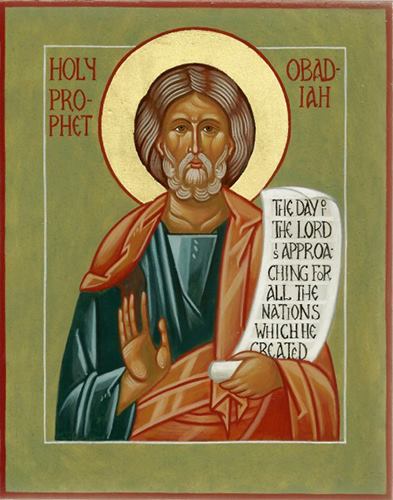 We know nothing certain about the life of the Prophet Obadiah. The Synaxarion identifies him with the servant of King Ahaz, who left to become a follower of Elijah, but that is not possible, since Obadiah’s prophecy was against Edom, pointing to a time after the exile. He is one of several prophets commemorated in the Phillip’s Fast, and verse 21 can be related to the coming of Jesus into the world: “And deliverers will ascend Mount Zion to rule Mount Esau, and the kingship shall be the Lord’s” (Obadiah 21).
We know nothing certain about the life of the Prophet Obadiah. The Synaxarion identifies him with the servant of King Ahaz, who left to become a follower of Elijah, but that is not possible, since Obadiah’s prophecy was against Edom, pointing to a time after the exile. He is one of several prophets commemorated in the Phillip’s Fast, and verse 21 can be related to the coming of Jesus into the world: “And deliverers will ascend Mount Zion to rule Mount Esau, and the kingship shall be the Lord’s” (Obadiah 21).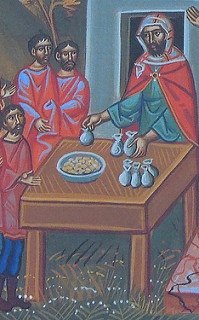 Read: Ephesians 5:9-19; Luke 12:16-21
Read: Ephesians 5:9-19; Luke 12:16-21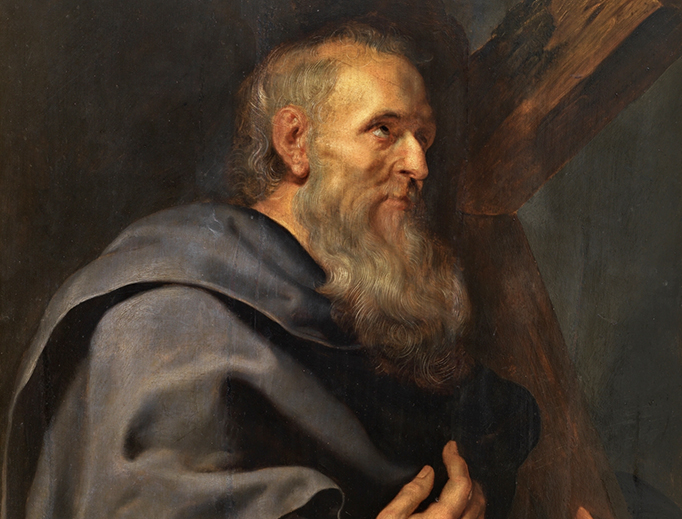 Today begins the Philip’s Fast (Pylypivka), the pre-Christmas fast – the day after the feast of Saint Philip, which was yesterday. The Byzantine Church identifies The Holy and All-Praiseworthy Apostle Philip as one who prepares us for the great time of the year: the Nativity/Theophany of Our Lord.
Today begins the Philip’s Fast (Pylypivka), the pre-Christmas fast – the day after the feast of Saint Philip, which was yesterday. The Byzantine Church identifies The Holy and All-Praiseworthy Apostle Philip as one who prepares us for the great time of the year: the Nativity/Theophany of Our Lord.